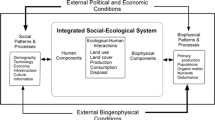Abstract
We analyze a core literature of urban ecology (all articles published in Urban Ecology and Urban Ecosystems from 1975–2004, n = 261) to support a reflexive analysis of the field. We structure this critical analysis based on criteria derived from programmatic statements made by scientific societies, research funding organizations and academic institutions regarding what urban ecology should be. Specifically, we assess the extent to which the literature reflects, and has evolved to reflect, a commitment to
-
strengthen and expand the discipline of ecology
-
create a transdisciplinary enterprise, and
-
contribute to social and ecological wellbeing through applied research and policy engagement.
Findings indicate that the literature strongly reflects these commitments, as these three tenets usefully describe the field and its evolution. We do, however, identify a tendency over time toward a more strictly disciplinary orientation. Ecological science is increasingly dominant and threatens to crowd out other scientific perspectives. This trend suggests that the field is maturing in the institutional sense, but perhaps at the cost of intellectual diversity, which many believe to be the basis of innovative solutions.
Similar content being viewed by others
References
Berkes K, Folke C (eds) (1998) Linking social and ecological systems: Management practices and social mechanisms for building resilience. Cambridge University Press, Cambridge, UK
Borgman C (ed) (1990) Scholarly Communication and Bibliometrics. 1st edn, Sage Publications, Newbury Park, CA
Collins J, Kinzig A, Grimm N, Fagan W, Hope D, Wu J, Borer E (2000) A New Urban Ecology. American Scientist 88(5):416–425
Cronon W (1991) Nature's Metropolis. W.W. Norton, New York
Dow K (2000) Social dimensions of gradients in urban ecosystems. Urban Ecosystems 4(4):255–275
Edquist, C (1997) Systems of Innovation: Technologies. Institutions and Organizations, Pinter Publishers, London
Etzkowitz H, Leydesdorff L (1998) The Triple Helix as a Model for Innovation Studies. Science and Public Policy 25(3):195–203
Fazey I, Fischer J, Lindenmayer D (2005) What do conservation biologists publish?. Biological Conservation 124:63–73
Fischer F (2000) Citizens, Experts, and the Environment. Duke University Press, Durham and London
Foresman T, Pickett S, Zipperer W (1997) Methods for spatial and temporal land use and land cover assessment for urban ecosystems and application in the greater Baltimore-Chesapeake region. Urban Ecosystems 1(4):201–216
Fouda Y (2001) A GIS for environmental assessment of air pollution impacts on urban clusters and natural landscape at Rosetta City and region. Egypt, Urban Ecosystems 5(1):5–25
Frederiksen L, Hansson F, Wenneberg S (2003) The agora and the role of research evaluation. Evaluation 9(2):149–172, viewed 12 December 2005, http://evi.sagepub.com/cgi/reprint/9/2/149
Frickel S, Moore K (eds) (2006) The New Political Sociology of Science: Institutions, Networks, and Power. University of Wisconsin Press, Madison
Frickel S (2004) Scientist Activism in Environmental Justice Conflicts: An Argument for Synergy. Society and Natural Resources 17(4):359–366
Hajer M, Wagenaar H (eds) (2003) Deliberative Policy Analysis: Understanding Governance in the Network Society. Cambridge University Press, Cambridge, UK
Hempel L (1996) Environmental Governance: the global challenge. Island Press, Washington, DC
Hunter I (2001) What do people want from urban forestry? The European experience. Urban Ecosystems 5(4):277–284
Mission statement 2005Web site, Institute of Ecosystem Studies, viewed 8 September 2005 http://www.ecostudies.org/about_mission.html
Kaiser J (2000) Taking a Stand: Ecologists on a Mission to Save the World. Science 287(5456):1188–1192
Kettl D (ed.) (2002) Environmental Governance. Brookings Institution Press, Washington, DC
Kuhn T (1970) The Structure of Scientific Revolutions. 2nd ed, vol 2, Foundations of the Unity of Science, University of Chicago Press, Chicago
Lyons J (1997) Urban ecosystem management: bringing science and policy together. Urban Ecosystems 1(1):77–83
May R (2004) Editorial: On the role of the humanities in urban ecology: the case of St. Petersburg. Urban Ecosystems 7(1):7–15
Mazari-Hirart M, Cifuentes E, Velazquez E, Calva J (2000) Microbiological groundwater quality and health indicators in Mexico City. Urban Ecosystems 4(2):91–103
Mazmanian D, Kraft M (eds) (1999) Towards Sustainable Communities. 1st edn. MIT Press, Cambridge, Massachusetts
McDonnell M, Pickett S, Groffman P, Bohlen P, Pouyat R, Zipperer W, Parmelee R, Carreiro M, Medley K (1997) Ecosystem processes along an urban-to-rural gradient. Urban Ecosystems 1(1):21–36
Mcintyre N, Knowles-Yanez K, Hope D (2000) Urban ecology as an interdisciplinary field: the differences in the use of “urban” between the social and natural sciences. Urban Ecosystems 4(1):5–24
Musacchio L, Wu J (2004) Collaborative landscape-scale ecological research: Emerging trends in urban and landscape ecology. Urban Ecosystems 7(3):175–178
‘NSF Funds First Long-Term Studies of Urban Ecology’ [Press release] 1997, National Science Foundation. http://www.nsf.gov/news/index.jsp?org=BIO, viewed 7 October 2005
Pickett S, Wan R, Dalton S, Foresman T, Grove J, Rowntree R (1997) A conceptual framework for the study of human ecosystems in urban areas. Urban Ecosystems 1(4):185–199
Porter E, Forschner B, Blair R (2001) Woody vegetation and canopy fragmentation along a forest-to-urban gradient. Urban Ecosystems 5(2):131–151
Rees W, Wackernagel M (1996) Urban Ecological Footprints: Why Cities Cannot Be Sustainable—And Why They Are A Key To Sustainabilit. Environmental Impact Review 16(4–6):223–248
Staerdahl J (2002) Editorial. The Journal of Transdisciplinary Environmental Studies 1(1):2–3
UN (2000) World Resources. The World Resources Institute, New York
Author information
Authors and Affiliations
Corresponding author
Rights and permissions
About this article
Cite this article
Young, R.F., Wolf, S.A. Goal attainment in urban ecology research: A bibliometric review 1975–2004. Urban Ecosyst 9, 179–193 (2006). https://doi.org/10.1007/s11252-006-8589-2
Published:
Issue Date:
DOI: https://doi.org/10.1007/s11252-006-8589-2



